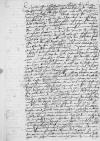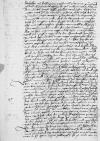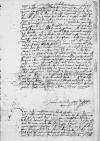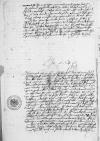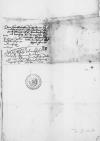Nicht wenig hot mich Ew(e)r Durchlaucheit eigener hand ⌊⌋, / den erst(e)n tag dits monts zu ⌊Heilsberg⌋ geben, / erfrewet, / dar aus ich mit grossem wolgefallen und freuden verstanden, / das E(wer) D(urchlauch)t mit irem ⌊gemahel⌋, / meiner hochgunstigen frawen, / und al den iren / in czimlicher gesuntheit / bis zu der stelle gelanget. / Hoffe vor dan(n), ouch bis heym so gekomen(n). / So bin ich (Got habe ehre und danck(en)) dergleichen(n) ouch den 1535-10-02⌊andren tag dis monts1535-10-02⌋ ⌊hie⌋ eingeczogen(n) / und aus götlichenn(n) gnaden alles richtig gefunden(n) etc. Was meinen(n) abscheid belangt von der ⌊person⌋ etc., wil ich E(wer) D(urchlauch)t nichts bergen(n). / Im freitag den 1535-09-17⌊XVII Septembr(is)1535-09-17⌋ vorgangenn(n), / wie ane zcweifel E(wer) D(urchlauch)t von dem h(e)rn ⌊danczker castellan⌋ vornomen(n), / hab ich von ⌊ko(nigliche)r m(aieste)t⌋, u(nserm) a(llergnedigsten) h(e)rn, vil gnedigen erlaub erlanget, / do selbst des svedischen handels gedocht. / Hot ⌊ir m(aieste)t⌋ geantwurt, / den selbigen(n) wolle durch eigenen(n) botschaffter(r) an die ⌊h(e)rn land und stet⌋ in rodt uff zukumfftiger ⌊tagfart⌋ gem ⌊Elbinge⌋ / neben irer m(aieste)t willen(n) / stellen und rodt daruber lossen halten(n), / dem, / wie ich mich vorsich, / ouch so geschen wirt. / Weiter sol an uns nichts abghen etc. Noch dissem abscheid / hab ich mich mit h(e)rn ⌊Czemen(n)⌋ zu der personen(n) begeben(n), / den sie von angesicht eilents his abtreten(n) / und mich bey sich siczen(n), / doch liss sich her Zceme wider einwerben(n). / ⌊Dem⌋ wart mit unfrunttlichem gesicht die hand geben(n), / do mit dar von(n) etc. dar noch, do die person noch eingeno(m)men(n), czorn(n) wider zu ir kuam. / Also neben ir siczend / must ich ein langen sermon horen, / der dennoch mit vil fruntlich(e)n worten und geberde war gemisschet, / gleicher weis, ab sie vorfurt mir etwen wer ungunstig worden(n), / mit vilem gutlichen ermanen(n), / das ich dem widerteil, der den seckel tregt, / mher dan h(e)rn ⌊Czemen⌋ suld zugethon un(n)d fruntlich sein, / mit vÿler / wider den gutten h(e)rn / beschuldung, / in welcher wunderliche unn(n)d gancz feintliche wort gefÿlen etc., und das endt war mit dem anfang, / den sermon durch, / gleich. / Do nun die person mit gutter mus und noch lust alles hette her vor gethon, / wart mir ouch zceit zu redenn(n) etc.,  GStA, PK, HBA, C 2, No 96, f. 1v derhalben ich bath, / man wold mich ouch mit gunst un(n)d geduld horen(n) / und vorczalte von anbegin, wie sichsmit dem seckel trager allenthalben(n) vorlouffen, / loss ouch nichts noch zu der worheit gehorig, / ouch also das mir in vilen sachen wart zugestanden(n), / temperirte jo dennoch so mein rede, / das ich der personen nichts teth zu messen, / allein bosen leuten, die mich felschlich mit unworheit hetten vormacht und zcwischen vilen andren reden, die sich begeben(n), / nemlich das ich h(e)rn ⌊Czemen⌋ ufftmols thet entschuldigen. / Wold sie wissen, wor aus die czweitracht zcwisschen im und dem seckel treger wer entsprossen(n), / des sie von mir klerlich wart vorstendigt, / das scheldwort weren gefallen, wie des seckeltregers vater etc. etc. und das endecket ich ir gruntlich / und befand, das etwan ir gemuet wider in wart vorandert, / doch bleib sie do bey, ich sold das thun von iren wegen / un(n)d sold im fruntlicher sein, dan h(e)rn ⌊Czemen(n)⌋. / Dar uff sagt ich das ⌊Ovidii⌋,
cf. Ov. Ars 2.107 ⌊ut ameris amabilis estocf. Ov. Ars 2.107 ⌋. / Wan(n) her sich der gestalt wurd halten(n), / muest ich dergleichen thun. / Der mossen sossze wir so uber ein gancze stund / und wan al dink sold(en) geschrib(e)n werden(n), / gehoret vil papir darzu, / ouch wil sich al dink nicht schreiben lossen etc. Ins endt wart in grosser fruntschafft und erbittung gescheiden(n), / das ich do vor ouch Got meinem(m) h(e)rn nicht wenig zu dancken(n) hab etc.
GStA, PK, HBA, C 2, No 96, f. 1v derhalben ich bath, / man wold mich ouch mit gunst un(n)d geduld horen(n) / und vorczalte von anbegin, wie sichsmit dem seckel trager allenthalben(n) vorlouffen, / loss ouch nichts noch zu der worheit gehorig, / ouch also das mir in vilen sachen wart zugestanden(n), / temperirte jo dennoch so mein rede, / das ich der personen nichts teth zu messen, / allein bosen leuten, die mich felschlich mit unworheit hetten vormacht und zcwischen vilen andren reden, die sich begeben(n), / nemlich das ich h(e)rn ⌊Czemen⌋ ufftmols thet entschuldigen. / Wold sie wissen, wor aus die czweitracht zcwisschen im und dem seckel treger wer entsprossen(n), / des sie von mir klerlich wart vorstendigt, / das scheldwort weren gefallen, wie des seckeltregers vater etc. etc. und das endecket ich ir gruntlich / und befand, das etwan ir gemuet wider in wart vorandert, / doch bleib sie do bey, ich sold das thun von iren wegen / un(n)d sold im fruntlicher sein, dan h(e)rn ⌊Czemen(n)⌋. / Dar uff sagt ich das ⌊Ovidii⌋,
cf. Ov. Ars 2.107 ⌊ut ameris amabilis estocf. Ov. Ars 2.107 ⌋. / Wan(n) her sich der gestalt wurd halten(n), / muest ich dergleichen thun. / Der mossen sossze wir so uber ein gancze stund / und wan al dink sold(en) geschrib(e)n werden(n), / gehoret vil papir darzu, / ouch wil sich al dink nicht schreiben lossen etc. Ins endt wart in grosser fruntschafft und erbittung gescheiden(n), / das ich do vor ouch Got meinem(m) h(e)rn nicht wenig zu dancken(n) hab etc.
Wie E(wer) D(urchlauch)t schreibt, die pollecey dis lands mit hantwerker, / gesind und andrem(m) betreffend, / wer hoch von noten dar zu gesehen, gerothen und gethon wurd. / Wir reden uff unsern tagfert(e)n vil do von(n), / folgt aber nichts darnoch. / Wirt ouch sverlich was nuczlichs zum gemeinen(n) besten geschen mugen, / ursach, / das ⌊dis land⌋ nicht einerleÿ leute und zcungen(n) ist, / un(n)d das ein parteÿ hie her / und die ander uff ein ander seiten hengt. / Zcwischen dissen czwen halten parteyen ist sverlich zu mittlen. / Wirt was gesoczt, das einem(m) gefelt, / so wirt gesagt, / es sey vor die deuczen und ghe uber die andren(n). / Wer wir eintrechtig, / muchten vil gutter ding zu nucz dem gemeinem(m) best(e)n geschen. / Es sol aber derhalb(e)n nicht noch bleib(e)n, was hirinne guts mag vorgenomen(n) werden(n) etc.
Vor die newe czeitung thu ich mich E(wer) D(urchlauch)t hochlich bedancken(n). / Got der almechtige gebe uns in dem orth ein mol fried / und den unsern(n) gesieg. / Wil ouch sie weiter, / wie E(wer) D(urchlauch)t bgert, / lossen gelangen(n). / Es ist mir vor IIII  GStA, PK, HBA, C 2, No 96, f. 2r tagen uff meim slosse ⌊Fridek⌋ vom ⌊colmischenn(n) landrichter⌋ gesagt, / das her ⌊Jorg von Baisen⌋ die zceit sprach loss sold haben gelegen(n). / Got gebe, dem(m) so nicht sey etc. Der ⌊colmische woywod⌋ ist ouch fast krank. / Gen uns solche h(e)rn ab aus unserm(m) ⌊rothe⌋, / besorge ich mich der andren leut einreissen / und dis ⌊lands⌋ ewigen(n) vorderb etc. /
GStA, PK, HBA, C 2, No 96, f. 2r tagen uff meim slosse ⌊Fridek⌋ vom ⌊colmischenn(n) landrichter⌋ gesagt, / das her ⌊Jorg von Baisen⌋ die zceit sprach loss sold haben gelegen(n). / Got gebe, dem(m) so nicht sey etc. Der ⌊colmische woywod⌋ ist ouch fast krank. / Gen uns solche h(e)rn ab aus unserm(m) ⌊rothe⌋, / besorge ich mich der andren leut einreissen / und dis ⌊lands⌋ ewigen(n) vorderb etc. /
Umb die grenicz(e)n zcwischen dem riesenburgschen und meiner Plowese / und des andren edelmans ⌊Plowenskj⌋, / wie ich zu ⌊Krako⌋ mit E(wer) D(urchlauch)t geredt, / bitt ich, wold vorschaffen, / so der she gefroren / und das eiss tragen(n) mag, / das die grenczen besichtiget mocht(e)n werden(n). Wolde ouch nicht vorgessen, / wie ich E(wer) D(urchlauch)t im(m) abscheid von(n) ⌊Krako⌋ gebeten(n), / was meiner ⌊svester⌋ man, den h(e)rn ⌊doctor(n)⌋ belanget, / sein beste zuvorsorgen / und sein gnediger h(e)r sein etc. Ich thu mich ouch hochlich bedancken des grusses, mir von E(wer) D(urchlauch)t ⌊furstin⌋, meiner hochgunstigen(n) frawen(n), zugeschribenn(n). Das sie aber mein ungeschaffne gestalt gern(n) wold sehen, / that ich nicht schreiben(n), / wie gern ich die ire, / die mit schoe superinscribed⌈ee superinscribed⌉nde und vil tugend gecziet, / zu sehen begere, / welchs die zceit und gutter weg ein mol geben wirt. / Thu mich so hiemit in Ew(e)r und ⌊ire f(urstliche) d(urchlauch)t⌋ gunst befhelen(n) etc. ⌊Ih(es)um Chr(ist)um⌋, unsrm(m) seligmacher bittend, wold beyden E(wer) D(urchlauch)t(en) ein langes, gesundes, / in lieb und furstlichs geslechts mherung, / leben, / glukselig regiment / und zu nhemen(n) / geben. /
Vom erst(e)n nachtleger von ⌊Krako⌋ schicket ich ein(n) diner zu rucken, um(m)b etliche brive, die aus der kanczley mir written over t⌈trr written over t⌉ noch zu bringen(n), / dem mein freuntlich(e)r bruder, her(r) ⌊Nibschicz⌋, / der von(n) kurf(urstlic)h(e)r d(urchlauch)t, / die her biss an die grencz(e)n beledt, / war wider komen(n), / dissen beygebund(enen) briff hot mit geben(n). / Hab im E(wer) D(urchlauch)t eh(e)r zu handen zu stellen(n) kein fueg gehabt. / In seinem widerkomen(n) hot her(r) ⌊Nibschcz⌋ ⌊ko(niglich)e m(aieste)t⌋ nicht wenig erfrewt. / Es ward gesagt, / das die kurfurstin sere svach und ubel zu friden sein sold,  GStA, PK, HBA, C 2, No 96, f. 2v welchs her unwor gemacht / und gesagt, das sie frisch und gesundt / und in allen dingen wol zu friden gewest. / Solche leut werden uff eiden gefund(en), die so aus neidt nymants guts gunnen(n), / boser zceitung alweg meister sein, / wie wol sie do von kein nucz, / dan pein von ander leut wolfart / haben(n) etc.
GStA, PK, HBA, C 2, No 96, f. 2v welchs her unwor gemacht / und gesagt, das sie frisch und gesundt / und in allen dingen wol zu friden gewest. / Solche leut werden uff eiden gefund(en), die so aus neidt nymants guts gunnen(n), / boser zceitung alweg meister sein, / wie wol sie do von kein nucz, / dan pein von ander leut wolfart / haben(n) etc.
H(er) ⌊Nibschicz⌋ ist den meisten teil darum(m)b wider komen(n), das her sich der botschafft an ⌊ro(misch)e ko(niglich)e m(aieste)t⌋ vorhofft, do neben ouch die besuchung der ⌊zukumfftigen unser jungen konigin⌋ zu thun etc. Der osterreichssche wein thut im wolgefallen(n). Hiemit aber in E(wer) D(urchlauch)t gunst befhol(e)n.
⌊Io(annes)⌋, c(olmischer) b(ischoff) etc. /
Ouch wil ich E(wer) D(urchlauch)t nicht bergen(n), / das ich mit dem(m) h(e)rn ⌊bischoffe von Ploczko⌋ das jenege, so uns E(wer) D(urchlauch)t befholen, ⌊ko(nigliche)r m(aieste)t⌋ / noch E(wer) D(urchlauch)t abscheid / haben(n) angetragen(n). Ins erst, in E(wer) D(urchlauch)t erbittung hot ⌊ir m(aieste)t⌋ gehabt nicht kleinen(n) wolgefallen(n). / Was die bethe vor h(ern) ⌊Hansen von Werden⌋ anghet, / sagt ⌊ir m(aieste)t⌋, wolde die zu irer zceit gedencken(n). / Vor h(ern) ⌊Jobst Luduig⌋ / antwurt ir ⌊m(aieste)t⌋, das her sich nicht dorffte besorgen, / es wurd in nymants, / so es do zu kuem, / dan ir m(aieste)t selbst richten. / Dorfft ouch nicht vil achten(n), / das sie uff tagfert(e)n, / welche vom adel geschickt, / wider in thet(e)n schreyen. / ⌊Ir m(aieste)t⌋ wuste wol, was zu thunde wer / etc. Hiemit sicht E(wer) D(urchlauch)t, das mich das alder anstosst / und das gedechtnis abnympt, / die weil ich so bey stucken schreib. / E(wer) D(urchlauch)t wolds der mensslichen(n) gebrechtlicheit in gunst noch geb(e)n u written over ...⌈... illegible⌈...... illegible⌉uu written over ...⌉nd ouch meiner armen burgerin und witwen hie, der kleine Maczin, nicht vorgessen, / das sie ire hundert m(a)rc(en), / die sie h(e)rn Slicken selig geligen / und sein eigenhantschrifft daruber hoth, / mocht erlangen(n), / hirinne der gerechtigheit noch thunde / ouch ein sunder werk der barmherczigheit etc.
 GStA, PK, HBA, C 2, No 96, f. 3v
GStA, PK, HBA, C 2, No 96, f. 3v  GStA, PK, HBA, C 2, No 96, f. 1r
GStA, PK, HBA, C 2, No 96, f. 1r  GStA, PK, HBA, C 2, No 96, f. 1v derhalben ich bath, / man wold mich ouch mit gunst un(n)d geduld horen(n) / und vorczalte von anbegin, wie sichsmit dem seckel trager allenthalben(n) vorlouffen, / loss ouch nichts noch zu der worheit gehorig, / ouch also das mir in vilen sachen wart zugestanden(n), / temperirte jo dennoch so mein rede, / das ich der personen nichts teth zu messen, / allein bosen leuten, die mich felschlich mit unworheit hetten vormacht und zcwischen vilen andren reden, die sich begeben(n), / nemlich das ich h(e)rn
GStA, PK, HBA, C 2, No 96, f. 1v derhalben ich bath, / man wold mich ouch mit gunst un(n)d geduld horen(n) / und vorczalte von anbegin, wie sichsmit dem seckel trager allenthalben(n) vorlouffen, / loss ouch nichts noch zu der worheit gehorig, / ouch also das mir in vilen sachen wart zugestanden(n), / temperirte jo dennoch so mein rede, / das ich der personen nichts teth zu messen, / allein bosen leuten, die mich felschlich mit unworheit hetten vormacht und zcwischen vilen andren reden, die sich begeben(n), / nemlich das ich h(e)rn  GStA, PK, HBA, C 2, No 96, f. 2r tagen uff meim slosse
GStA, PK, HBA, C 2, No 96, f. 2r tagen uff meim slosse  GStA, PK, HBA, C 2, No 96, f. 2v welchs her unwor gemacht / und gesagt, das sie frisch und gesundt / und in allen dingen wol zu friden gewest. / Solche leut werden uff eiden gefund(en), die so aus neidt nymants guts gunnen(n), / boser zceitung alweg meister sein, / wie wol sie do von kein nucz, / dan pein von ander leut wolfart / haben(n) etc.
GStA, PK, HBA, C 2, No 96, f. 2v welchs her unwor gemacht / und gesagt, das sie frisch und gesundt / und in allen dingen wol zu friden gewest. / Solche leut werden uff eiden gefund(en), die so aus neidt nymants guts gunnen(n), / boser zceitung alweg meister sein, / wie wol sie do von kein nucz, / dan pein von ander leut wolfart / haben(n) etc.
